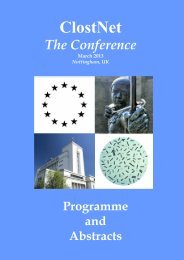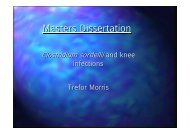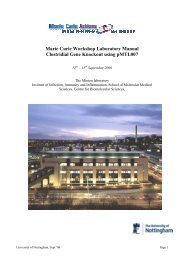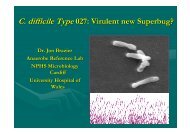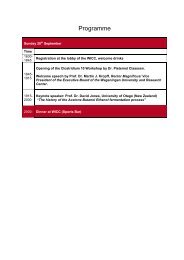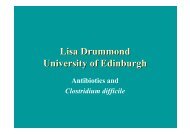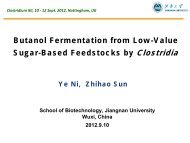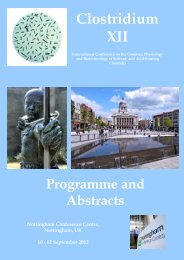abstract book - Clostridia
abstract book - Clostridia
abstract book - Clostridia
Create successful ePaper yourself
Turn your PDF publications into a flip-book with our unique Google optimized e-Paper software.
GENE TOOLS AND THEIR APPLICATION TO CLOSTRIDIUM<br />
BOTULINUM<br />
N.P. Minton, C.M. Cooksley, I. Davis, J.T. Heap, S.T. Cartman, B.A.<br />
Blount & O.J. Pennington.<br />
Institute of Infection, Immunity & Inflammation, Centre for Biomolecular<br />
Sciences, School of Molecular Medical Sciences, University of<br />
Nottingham, Nottingham, GN7 2RD, UK.<br />
Despite the medical and industrial importance of the genus Clostridium<br />
our understanding of their basic biology lags behind that of their more<br />
illustrious counterpart, Bacillus. The advent of the genomics era has<br />
provided new insights, but full exploitation of the data becoming available<br />
is being hindered by a lack of mutational tools for functional genomic<br />
studies. Thus, in the preceding decades the number of clostridial mutants<br />
generated has been disappointingly low. On the one hand, the absence<br />
of effective transposon elements has stymied random mutant generation.<br />
On the other hand, the construction of directed mutants using classical<br />
methods of recombination-based, allelic exchange has met with only<br />
limited success. Indeed, in the majority of clostridial species mutants are<br />
largely based on integration of plasmids by a Campbell-like mechanism.<br />
Such single crossover mutants are unstable. As an alternative,<br />
recombination-independent strategies have been developed that are<br />
reliant on retargeted group II intron. One element in particular, the<br />
ClosTron, has been devised which provides the facility for the positive<br />
selection of mutants. ClosTron-mediate mutant generation is extremely<br />
rapid, highly efficient and reproducible. Moreover the mutants made are<br />
extremely stable. Its deployment considerably expands current options<br />
for functional genomic studies in Clostridium botulinum.<br />
45



